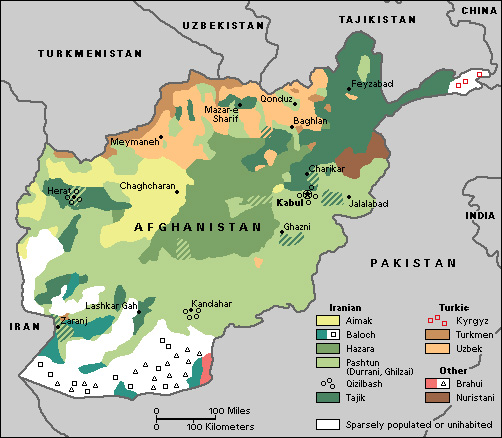Pashtuns << pash TOONZ >> are one of the largest ethnic groups in Afghanistan and Pakistan. They make up about 40 percent of Afghanistan’s population and about 15 percent of Pakistan’s people. Most Pashtuns live near the border between Afghanistan and Pakistan.
Other names for the Pashtuns include Pathans, Pakhtuns, Pukhtuns, and Pushtuns. They speak Pashto, also called Pakhto, Pushtu, or Pukhtu, a language related to Persian. Almost all Pashtuns are Muslims.

The Pashtuns consist of about 40 tribes divided into groups of related families. Democratic councils called jirgas govern tribal affairs. Although the tribes unite to fight invaders, they often feud with one another. Some of the feuds have raged for centuries.
Many Pashtuns work as farmers, raising wheat and other grains, fruits, nuts, and sugar cane. Others are nomads who breed horses and herd sheep, goats, cattle, and camels. Many farmers live in homes made of mud-brick. Most nomads live in tents made of goat hair. Some Pashtuns combine farming with nomadic herding.
Ancestors of the Pashtuns lived in what is now Afghanistan by about 4000 B.C. In the A.D. 1500’s, some Pashtuns moved to present-day Pakistan. During the 1800’s and early 1900’s, Pashtun warriors became the dominant group among Afghans who fought and won a series of wars against the British. Britain was seeking control of Afghanistan’s foreign policy as part of its competition with Russia for influence in the region.
In late 1979, the Soviet Union invaded Afghanistan. Pashtuns formed guerrilla bands to help repel the invasion. The Soviets withdrew from Afghanistan in 1988 and 1989. By the late 1990’s, a militant, Pashtun-dominated group known as the Taliban had taken control of most of Afghanistan. Afghan rebels, aided by the United States and its allies, forced the Taliban from power in 2001. However, some Taliban later regrouped and continued fighting. They seized control of Afghanistan again in 2021.
See also Afghanistan (People) (History); Federally Administered Tribal Areas; Pakistan (People).
